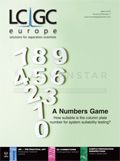31st International Symposium on Chromatography (ISC 2016)
The 31st International Symposium on Chromatography (ISC 2016) will be held from 28 August–1 September 2016 at University College Cork, Cork, Ireland.
Image Credit: Courtesy of the Author

The 31st International Symposium on Chromatography (ISC 2016) will be held from 28 August–1 September 2016 at University College Cork, Cork, Ireland. This major chromatography conference will be hosted in the Emerald Isle for the first time in its history and will attract chromatographers from around the world. The greater Cork area is home to nine of the top 10 global pharmaceutical companies in the world, and seven out of 10 of the world’s best-selling drugs are produced there. As a major European centre for the life science industry, Cork is an ideal choice to host ISC 2016.
Furthering the international appeal of the ISC series, The Chromatographic Society (ChromSoc) will be sponsoring key presentations at ISC 2016 in celebration of its 60th anniversary. ISC 2016 will also host the prestigious “Award for Outstanding Achievements in Separation Science”, which is awarded to a preeminent separation scientist by the California Separation Science Society (CaSSS).
ISC 2016 provides the perfect forum for scientific exchange between attendees from academia, industry, and government research institutions, as well as excellent networking opportunities with up to 800 international delegates expected to attend. The major focus of the symposium will be on the impact and continuing contribution of chromatography and separation science to the pharmaceutical industry, food, health, science, and medicine.
The major theme of ISC 2016 will be the Innovation and Impact of Chromatographic Separations on Science, Industry, and Life. The symposium programme reflects these themes, and aims to highlight new challenges and emerging opportunities in separation science detection systems, methods, and marketing solutions. The scientific programme is set to be wide ranging and diverse with topics including:
- Pharmaceutical
- Biomedical
- Forensics
- Environmental analysis
- Process chromatography
- PAT
- Biomarkers
- Diagnostics and clinical analysis
- “Omics” technologies
- New material science
- Characterization, miniaturization, and on-chip devices
- Mass spectrometry
- Food and health
- Separation and sensing
- Trace elements speciation
- Supercritical fluid applications
- Biopharmaceutical
International leaders in each of these areas will provide inspiring and thoughtâprovoking presentations to stimulate researchers. While an international exhibition and vendor lecture series on instrumentation and services for chromatography, separation science, and mass spectrometry will add another integral part to the scientific programme.
ISC organizers look forward to introducing attendees to the famous Irish hospitality and the charms of Cork with the nearby coastlines, beaches, hiking routes, cycling routes, and world-class golf courses offering exceptional scenery. While the city’s wide array of hotels, restaurants, traditional music and dancing, and, of course, exceptional scientific conferences complete the package.
The deadline for submitting oral abstracts is 15 March 2016. The final date for submitting a poster abstract is Tuesday 26 April 2016. Early bird registration is open now and ends 26 May 2016. On-line registration closes 25 August 2016.
Co-Chairs: Apryll Stalcup and Jeremy D. Glennon
Tel: +353 1 280 2641
E-mail: ISC2016@mci-group.com
Website: http://www.isc2016.ie/

Removing Double-Stranded RNA Impurities Using Chromatography
April 8th 2025Researchers from Agency for Science, Technology and Research in Singapore recently published a review article exploring how chromatography can be used to remove double-stranded RNA impurities during mRNA therapeutics production.
The Effect of Time and Tide On PFAS Concentrations in Estuaries
April 8th 2025Oliver Jones and Navneet Singh from RMIT University, Melbourne, Australia discuss a recent study they conducted to investigate the relationship between tidal cycles and PFAS concentrations in estuarine systems, and offer practical advice on the sample preparation and LC–MS/MS techniques they used to achieve the best results.











